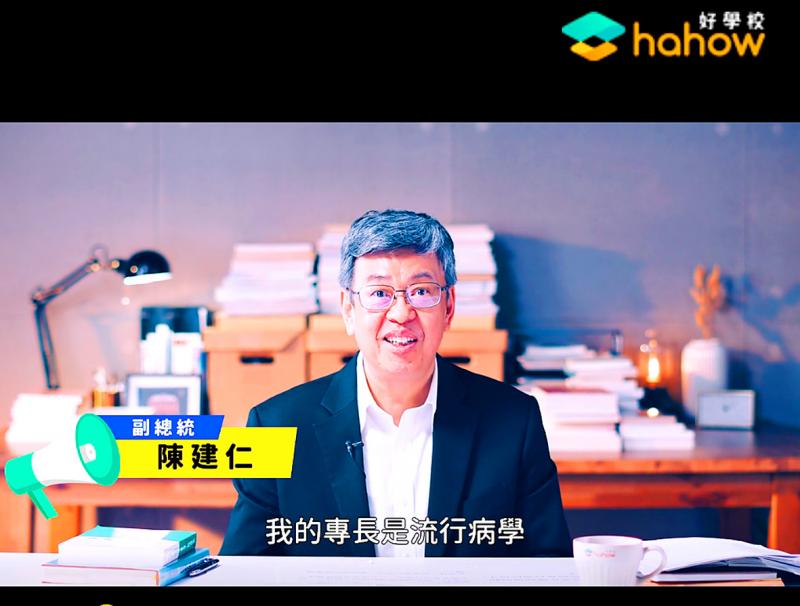Vice President Chen Chien-jen (陳建仁) yesterday joined online educational platform Hahow with a video about disease prevention, in which he shares his views on Taiwan’s experience containing COVID-19, what to do in face of the pandemic and future developments of the disease.
The 45-minute online course would be free and open to everyone, Chen wrote on Facebook, inviting the public to sign up.
The unique characteristic of COVID-19 is that it has no distinctive symptom and that its infectivity is strong, said Chen, an epidemiologist by training.

Photo grab from a video on Hahow’s Web site
Without vaccines, rapid test kits or related medication, it is imperative to quarantine all known cases, something Taiwan has done quite well, he said.
It is not necessary for Taiwan to conduct universal screening for the novel coronavirus, as Taiwan, unlike South Korea, has had relatively few confirmed infections, Chen said.
Taiwan’s screening ratio and coverage trails only those of the United Arab Emirates and Russia, demonstrating that its screening plan is appropriate, he said.
Chen called on the public not to judge people returning from areas hard-hit by COVID-19 or who have tested positive after being in close proximity to known cases.
“They needed to travel abroad or were exposed to family members; we should be understanding and have empathy,” he said.
No nation can face the danger posed by COVID-19 alone and the global community must band together, Chen said.
It is based on this idea that Taiwan has begun helping other nations, he said, quoting President Tsai Ing-wen’s (蔡英文) slogan: “Taiwan can help, Taiwan is helping.”
As for future developments of the disease, Chen said that it would be difficult to eradicate the coronavirus from the world, but, like influenza, Taiwan would be equipped to deal with it.
For that to happen, vaccines, medication targeting the coronavirus and rapid test kits must be developed, he said.
Viable test kits could hit the market within three months, while drugs — after undergoing clinical trials — could be available within the next six months, Chen said, but added that vaccine development would perhaps need another year to a year and a half.
Until then, quarantine efforts are the best option to give Taiwan more time, he said.
Chen holds a doctorate in epidemiology and human genetics from Johns Hopkins University. He also served as vice president of Academia Sinica.

A strong continental cold air mass is to bring pollutants to Taiwan from tomorrow, the Ministry of Environment said today, as it issued an “orange” air quality alert for most of the country. All of Taiwan except for Hualien and Taitung counties is to be under an “orange” air quality alert tomorrow, indicating air quality that is unhealthy for sensitive groups. In China, areas from Shandong to Shanghai have been enveloped in haze since Saturday, the ministry said in a news release. Yesterday, hourly concentrations of PM2.5 in these areas ranged from 65 to 160 micrograms per cubic meter (mg/m³), and pollutants were

Taiwan’s armed forces have established response protocols for a wide range of sudden contingencies, including the “Wan Chun Plan” to protect the head of state, the Ministry of Defense (MND) said today. After US President Donald Trump on Saturday launched a series of airstrikes in Venezuela and kidnapped Venezuelan President Nicolas Maduro, concerns have been raised as to whether China would launch a similar “decapitation strike” on Taiwan. The armed forces regularly coordinate with relevant agencies and practice drills to ensure preparedness for a wide range of scenarios, Vice Minister of National Defense Hsu Szu-chien (徐斯儉) told reporters before a

EVA Airways on Saturday said that it had suspended a pilot and opened an investigation after he allegedly lost his temper and punched the first officer several times as their plane was taxiing before takeoff at Los Angeles International Airport. According to a report published on Thursday by The Reporter, the incident occurred after the flight’s Malaysian first officer tried to warn the Taiwanese pilot, surnamed Wen (文), that he was taxiing faster than the speed limit of 30 knots (55.6kph). After alerting the pilot several times without response, the first officer manually applied the brakes in accordance with standard operating

Japanese Councilor Hei Seki (石平) on Wednesday said that he plans to visit Taiwan, saying that would “prove that Taiwan is an independent country and does not belong to China.” Seki, a member of the Japan Innovation Party, was born in Chengdu in China’s Sichuan Province and became a naturalized Japanese in 2007. He was elected to the House of Concilors last year. His views on the Chinese Communist Party (CCP) — espoused in a series of books on politics and history — prompted Beijing to sanction him, including barring Seki from traveling to China. Seki wrote on X that he intends